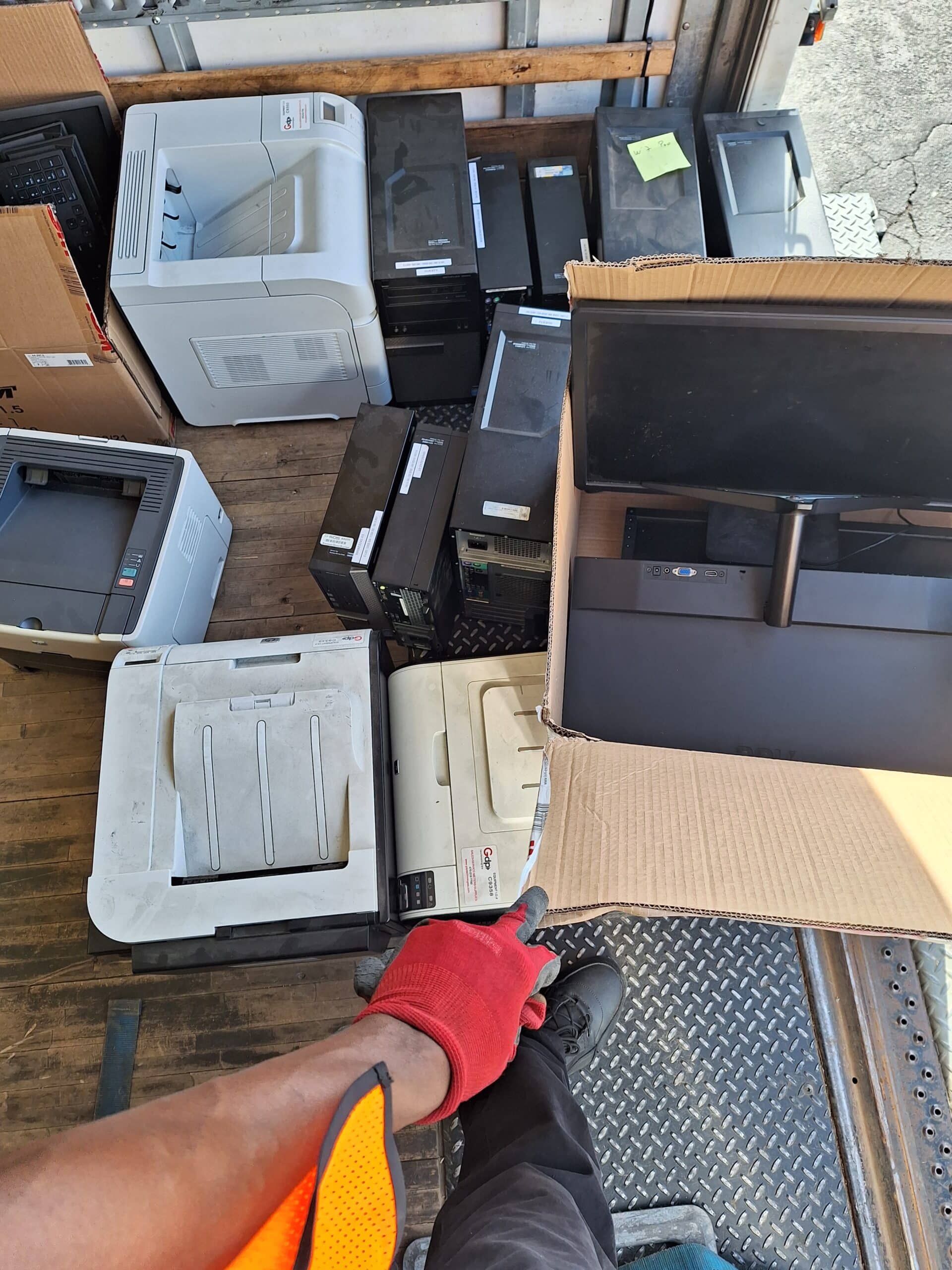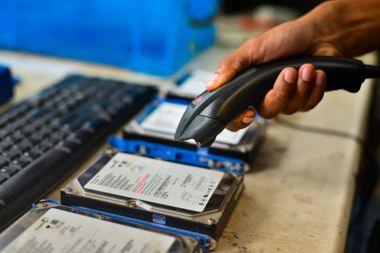Revitalize Your Office with Accountable Computer Recycling Practices
Wiki Article
Sustainable IT Solutions: Trustworthy Computer Recycling Provider
As technology proceeds to advance at a rapid speed, the issue of digital waste, or e-waste, has come to be a pressing problem for both organizations and individuals alike. The inappropriate disposal of computers and other digital tools not just contributes to environmental deterioration, but likewise positions significant risks to human health. In light of this, the requirement for credible computer reusing services has never ever been more vital. In this discussion, we will certainly discover the ecological effect of e-waste, the advantages of responsible computer recycling, how to select a trustworthy recycling solution, the reusing procedure for computers and digital tools, and the duty of federal government laws in e-waste monitoring. Join us as we reveal the lasting IT options that can aid us browse the intricacies of electronic waste in a accountable and reliable way.The Environmental Influence of E-Waste
The inappropriate disposal of digital waste, generally recognized as e-waste, has considerable environmental ramifications. E-waste refers to thrown out digital gadgets such as televisions, mobile phones, and computers (computer recycling). These tools consist of unsafe materials such as lead, mercury, cadmium, and brominated fire resistants, which can be hazardous to both human health and the setting otherwise correctly taken care ofWhen e-waste is improperly gotten rid of, it often ends up in land fills or is incinerated, releasing toxic compounds right into the soil, air, and water. The release of these harmful materials can contaminate groundwater, contaminate the air, and add to soil deterioration, posing serious health risks to nearby neighborhoods and communities.
Moreover, the improper disposal of e-waste likewise adds to the depletion of natural deposits. computer recycling. If appropriately recycled, numerous digital tools contain useful metals like gold, silver, and copper that can be recuperated and reused. When e-waste is not recycled, these important sources are lost, and the need for brand-new raw products boosts, leading to enhanced mining tasks and more ecological destruction.
To mitigate the environmental effect of e-waste, correct recycling and disposal approaches have to be used. This consists of the responsible collection, dismantling, and recycling of digital gadgets to recoup useful products and make sure the secure monitoring of unsafe materials. Carrying out effective e-waste administration methods is crucial to protect the setting, save resources, and advertise a lasting future.

Advantages of Liable Computer System Recycling
Properly reusing computer systems provides a multitude of advantages, consisting of ecological conservation and source conservation. Liable computer recycling not just helps stop electronic waste from ending up in land fills, but it additionally decreases the need for raw materials and energy in the manufacturing of new tools.One of the most significant benefits of liable computer system recycling is the conservation of the environment. When electronic waste is improperly taken care of, it can release dangerous substances such as lead, mercury, and cadmium right into the dirt and water, presenting a hazard to ecological communities and human health and wellness. By reusing computers, these hazardous products can be securely extracted and taken care of, reducing the danger of contamination.
An additional advantage is source preservation. Computer systems include beneficial materials like gold, copper, silver, and aluminum, which can be recovered and recycled via recycling procedures. By removing and reusing these materials, the demand for mining new sources is decreased, preserving natural deposits and decreasing the ecological influence of resource extraction.
Moreover, liable computer system reusing assists to lower power consumption. Manufacturing brand-new computer systems requires a considerable quantity of power, from the removal of resources to the assembly process. By recycling computer systems and recycling their parts, the energy-intensive production process can be avoided, resulting in a decrease in greenhouse gas discharges and an extra lasting use power resources.
How to Choose a Trustworthy Computer Recycling Solution
When selecting a computer recycling service, it is necessary to take into consideration a couple of vital variables to make certain that you pick a trustworthy and trusted carrier. It is crucial to validate if the recycling solution follows appropriate environmental guidelines and techniques. A trustworthy company will certainly have qualifications and accreditations that show their commitment to liable recycling. Search for certifications such as R2 (Accountable Recycling) or e-Stewards, which ensure that the reusing procedure meets strict requirements for ecological defense and information protection. Inspect if the service provides safe and secure data destruction. Information safety and security is a crucial concern when reusing computer systems, as delicate information saved on old gadgets can be vulnerable to burglary or misuse. A trustworthy recycling solution should have protected data damage procedures in location, such as information cleaning or physical damage of storage space gadgets. Additionally, take into consideration the solution's performance history and online reputation. Look for testimonials or reviews from previous consumers to evaluate their degree of customer contentment and reliability. Consider the solution's transparency and accountability. A reliable supplier must be able to supply thorough details concerning their reusing procedure, consisting of exactly how they handle hazardous materials and make sure appropriate disposal. By thinking about these elements, you can pick a computer recycling service that is moral, reliable, and environmentally liable.
The Recycling Refine for Computer Systems and Digital Instruments
To make certain accountable disposal and reduce ecological effect, understanding the reusing procedure for computers and electronic tools is essential when selecting a trustworthy recycling solution. The recycling procedure for these tools typically entails numerous phases.First of all, the gadgets are accumulated from individuals, organizations, or drop-off factors. This collection procedure may entail transportation logistics and secure dealing with to protect the delicate data included within the tools. As soon as collected, the devices are arranged based on their kind, such as laptops, desktops, or smart devices.
After sorting, the tools go through a comprehensive data damage process to ensure that any type of personal or delicate details is completely removed. This action is important to safeguard the personal privacy and security of individuals and organizations. Information damage approaches may consist of wiping, degaussing, or physical destruction of the storage media.
Following, the gadgets are disassembled right into their private parts. This enables for the splitting up of various materials, such as plastics, metals, and circuit boards. These materials are after that sent to specialized recycling facilities for more handling.
The recycling centers use numerous methods to remove valuable materials from the digital waste. These materials can be reused or repurposed in the manufacturing of new items. The continuing to be waste is gotten rid of visit their website in an eco liable fashion, adhering to governing guidelines.
The Function of Government Laws in E-Waste Administration
Government guidelines play an essential role in the reliable monitoring of e-waste. With the continuous growth of the electronic devices market and the raising problem for ecological sustainability, the requirement for appropriate disposal and recycling of digital waste has become more evident. Government regulations aid to make certain that e-waste is handled in a accountable and lasting fashion.One of the main roles of government policies is to establish standards and standards for e-waste monitoring. These laws specify the appropriate methods for collection, transport, and recycling of digital waste. By developing these requirements, governments can ensure that e-waste is dealt with in such a way that reduces its effect on the atmosphere and human health.
This consists of implementing take-back programs, where manufacturers are accountable for accumulating and recycling electronic waste from consumers. These guidelines aid to shift the problem of e-waste monitoring from the private consumer to the market, find this making certain that electronic waste is taken care of in a more sustainable fashion.

Final Thought
Finally, it is critical to consider the environmental impact of e-waste and select a trustworthy computer recycling service to responsibly take care of digital tools. By following government laws and participating in appropriate reusing processes, we can reduce the negative results of Visit Website e-waste on the atmosphere and advertise an extra lasting future.In this conversation, we will check out the ecological influence of e-waste, the advantages of liable computer system recycling, just how to select a reliable recycling solution, the recycling process for computers and digital devices, and the role of government guidelines in e-waste management. Computer systems include valuable materials like gold, copper, light weight aluminum, and silver, which can be recovered and recycled via reusing procedures.Furthermore, responsible computer system reusing aids to lower energy consumption. Information safety is a crucial concern when reusing computer systems, as delicate details stored on old tools can be at risk to burglary or misuse. By taking into consideration these aspects, you can pick a computer system recycling solution that is honest, reputable, and ecologically responsible.
Report this wiki page